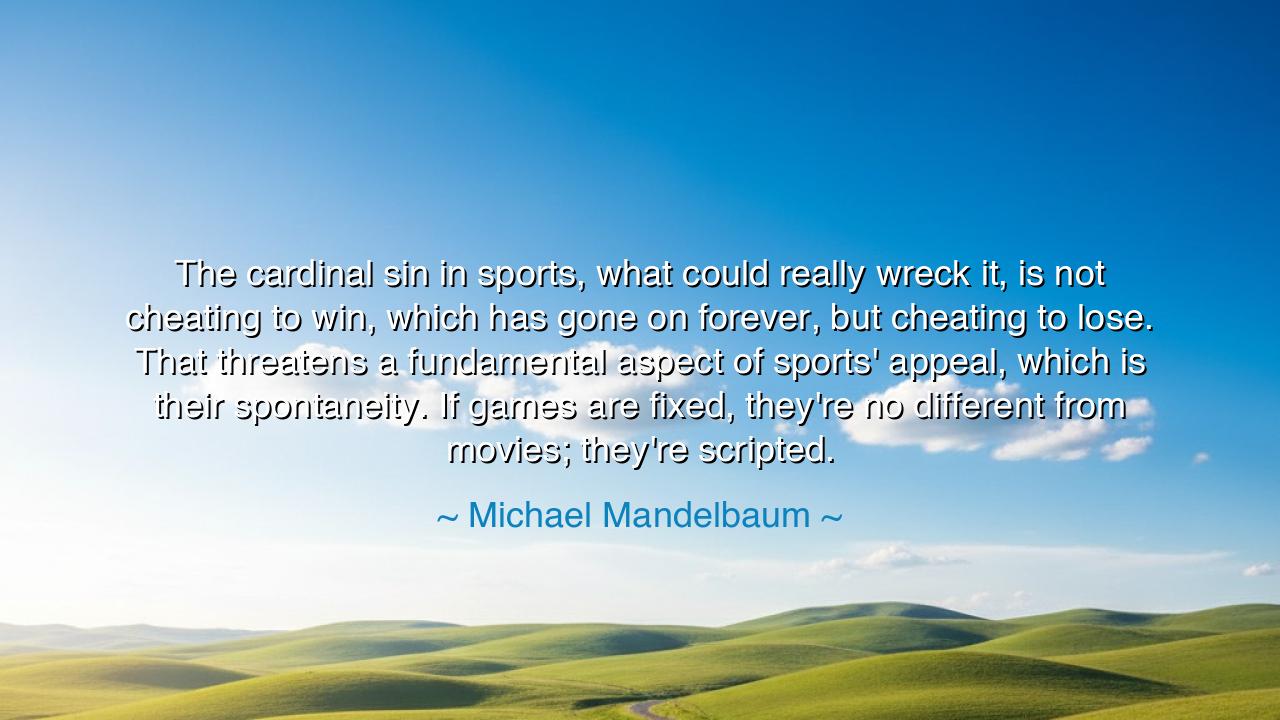
The cardinal sin in sports, what could really wreck it, is not
The cardinal sin in sports, what could really wreck it, is not cheating to win, which has gone on forever, but cheating to lose. That threatens a fundamental aspect of sports' appeal, which is their spontaneity. If games are fixed, they're no different from movies; they're scripted.






The words of Michael Mandelbaum ring out like a stern warning from the elders: “The cardinal sin in sports, what could really wreck it, is not cheating to win, which has gone on forever, but cheating to lose. That threatens a fundamental aspect of sports' appeal, which is their spontaneity. If games are fixed, they're no different from movies; they're scripted.” At the heart of this declaration lies a profound truth about the essence of competition, about the fragile trust upon which the spectacle of sport rests, and about the sacred bond between athlete and audience.
For to cheat in order to win, while dishonorable, still acknowledges the sanctity of the struggle. It admits that victory is the highest prize, and though the means may be corrupted, the end goal remains bound to the spirit of the game. But to cheat in order to lose—to throw away the struggle, to betray the contest itself—is to commit a greater treachery. It is to strip sport of its soul, to poison the well from which joy and passion flow. For the beauty of sport lies in its spontaneity, its uncertainty, its promise that at any moment the unlikely may happen, that the underdog may rise, that fate itself may be rewritten by courage.
History gives us examples of this darkness. Recall the scandal of the 1919 Black Sox, when ballplayers of the Chicago White Sox conspired with gamblers to deliberately lose the World Series. What should have been the grandest stage of America’s pastime became a stage of betrayal. The faith of the people was shattered, for they saw that what they had believed to be unscripted drama was nothing but a performance bought and sold. The players were banned, the nation’s trust deeply wounded, and the echo of that corruption lingers even to this day.
Contrast this with the struggles of those who fought only to win, however imperfect their methods. The East German swimmers who doped, the cyclists of later generations who relied on banned aids—they sought advantage, yes, but still within the pursuit of victory. Their sins, while grave, did not annihilate the core appeal of sport: the battle for triumph. The contest still unfolded, the outcome was still uncertain to the players themselves. But when athletes throw games, there is no contest at all—only a hollow playacting that mocks both participants and spectators.
The ancients too revered the purity of competition. At Olympia, athletes swore sacred oaths before the gods not to dishonor the games. Cheating could bring disgrace, even exile, but the notion of conspiring to lose would have been unthinkable, for it would have profaned not only the contest but the gods themselves. Victory or defeat mattered less than the authenticity of the struggle. And so it is today: sports are a mirror of life itself, because they are unscripted, because no one knows the ending until the last moment is played.
The lesson, then, is clear: guard the spontaneity of life and of struggle. Do not betray the contests you enter, whether on the field, in the arena, or in the battles of your own life. To fight and fall with honor is far nobler than to cast away the fight in deceit. Even in defeat, there is dignity, but in deliberate surrender disguised as competition, there is only shame.
Therefore, let every player, every fan, every soul who delights in the drama of struggle remember this truth: sports—and indeed life—are not worth living if they are scripted. The magic lies in the unknown, in the sweat that may yield glory or defeat, in the unfolding story that no one can write in advance. Protect this with vigilance, for without it, both games and life become empty performances.
And so Mandelbaum’s words endure: the greatest sin is not in the crooked attempt to win, but in the deliberate betrayal to lose. Guard against it in sport, and guard against it in life. For the battles we fight must be real, the struggles authentic, if the triumphs are to shine with true light.






AAdministratorAdministrator
Welcome, honored guests. Please leave a comment, we will respond soon